C.H. Cobb's Blog, page 5
September 29, 2020
Personalities and Parties and the stewardship of kingdoms in conflict
The culture today does not like binaries, but like it or not this election is a binary situation: Biden vs Trump, the Dems vs the Repubs, Progressives vs Conservatives. You can’t get away from it, and you can’t honestly deny it.
Yes, you can refuse to vote—which I think is a failure on your part to exercise your stewardship. Or you can vote for a third party or write-in candidate, which can be a legitimate, Christ-honoring decision. At least you are voting your conscience.
At the end of the day, however, the result is an inescapable binary: Biden will win, or Trump will win. No matter who you vote for, or even if you refuse to vote, your stewardship of your earthly citizenship is going to be a factor contributing to whomever wins or loses. You areplayinga part in the outcome: it’sunavoidable.
There are personalities on the ticket: Biden/Harris, Trump/Pence. A significant portion of the voting public willuse their vote to express their like/dislike, respect/disdain for the personalities on the ticket. Character counts.
We pause from our regularly scheduled post for a personal confession: in 2016 I voted third party because I could not bring myself to vote for a character as offensive as Donald Trump. I wrote posts against Donald Trump, because I believed (and still believe) that character counts. My vote four years ago was a consideredexercise of the stewardship of my Christian responsibility to engage with this fallen world. This year, however, I will pull the lever for Trump. My reasons will become clear as you read. It has far more to do with worldviewthan with Trump, Republicans, politics or power. More on that in a minute.
Character does count. The character of our leaders provides a (hopefully) good model for our kids. It creates (or destroys) the president’s credibility with not only world leaders, but our own legislators. It signals to the society at large what sort of behavior is going to be considered acceptable. Character is vital.
But in a presidential election, character is not the only factor; sometimes it isn’t even the most urgent factor. When we are electing a president, we are also electing a party along withits platform and its historic trajectory.
A party’s platform is comprised of its stated intentions in a variety of different areas, typically including things like fiscal priorities, domestic priorities, foreign policy, defense, entitlements and so forth. Usually some portion of the platform issuccessfully implemented duringa president’s term whileother portions wind up getting blocked, depending on who controls the Congress.
Everyone knows about platforms, but what about trajectories? Trajectories have to do with where a party has taken the country in the past; in other words, what the party has actually accomplished. The trajectory of a political party is the best, most reliable indicator of where it is going in the future. Trajectory reveals the direction and speed of momentum, regardless of the personalities on the ticket. Presidents come and go, but the momentum of the party tends to continue along the same basic lines it has established inthe past.
You can look back fifty years and observethe trajectories established by the two major parties. The Republican party has stood for a conservative, originalist interpretation of the Constitution, conservative moral values, the sanctity of life, support of the family, parental sovereignty, educational choice, freedom of religion, limited government. The sins of the Repubs are many, and I have written about these. Crony capitalism, fiscal irresponsibility, graft, corporate welfare, plenty of examples of high-profile hypocritical moral failure—its all there in the Republican party. But with all its failures, the overall trajectory of the Republican party has been to stay the course and stick to the Constitution.
Over the past fifty years the trajectory of the Democratic party has been very different. While there have been good things produced by the party, the historic path has been a full-bodied support of the sexual revolution, a non-negotiable fanatical support for virtually unrestricted abortion, a growing love of socialism and redistribution, a growing hatred of America and its history, a diminishing of parental sovereignty and the importance of families, limitations on educational choice, encouraging dependence on government, and viewing the Constitution as a “living document” that can be interpreted in whatever way the culture demands.
Thismomentum in the Democratic party, especially with regard to the LGBTQ+ movement in the last 15 years, has been breathtaking. It is accelerating rapidly, to the point that our country in four years probably will not bear a great deal of resemblance to the America of 2000.
Perhaps you prefer the path on which the Democrats are taking the country. Perhaps you prefer the Republican’s path. Whatever your preference, the trajectories areundeniable—and the party you put in power with your vote will continue itstrajectory regardless of the particular personality at the helm.
I published a novel in August, 2016, entitled The Candidate. It was about a fictional character, Henry Marshall, who found himself an independent candidate in a presidential election. Many who read that novel contacted me to say they wished they could vote for Henry Marshall. So do I. But we can’t. Marshall is not on the ticket. The binary possibility is Biden or Trump.
Given the quandary this election presents, I believe that a straightforward vote based on the candidate is not necessarily the wisest decision—in fact, it might be rathershort-sighted. Far, far more important in this election is the fact that we are choosing between two well-established, undeniable trajectories. One is aggressively hostile against Christianity, against families, against moral sanity. One is not. When you are presented with the difficult choices this election represents, I am suggesting that what Christians should vote for is trajectory, not personalities.
Many people are not voting FOR as much as they are voting AGAINST. In other words, some Christians are not voting FOR abortion when they pull the lever for Biden (though some are), they are voting AGAINST Trump. Other Christians are not voting FOR Trump (though some are) when they pull his lever, they are voting AGAINST the established Democratic trajectory that threatens the moral sanity and well-being of the country. In fairness to one another, when we disagree we must not accuse each other of moral compromise, because most Christians caught in this Gordianknot will be honestly voting their conscience. But we are going to have to live with the extended consequences of our vote.
My goalis to persuade your conscience that this year, in this difficult election, the weightiest, wisest consideration is not the character of the two men involved (important though that consideration is), but the trajectories their respective parties have established. Given the established record of the past, where will the winning party take the country in the future? Do you really want to live there? Do you want your children to live there?
When you vote for a trajectory, you are voting for a worldview. In my next post I’ll give evidence of the deeply hostile, aggressive posture of the progressive movement (to which the Democratic party is beholden) toward biblical Christianity.
September 28, 2020
Biden, Trump, and the stewardship of kingdoms in conflict
We are living in a day in which Bible-believing Christians seem to have difficulty connecting the bright lines of Scripture to the dots of life. One of the spheres in which this is readily apparent is that of politics.
Having said that, let me quickly affirm that God is not a Republican or a Democrat. Some of you might be shocked to learn He’s not a Libertarian, either. He is not a liberal or conservative. He doesn’t belong to the now-defunct Moral Majority, nor is He hiding out in the chapel of Liberty University. God does not fit under human rubrics or categories. Quite the opposite, in fact. Humansfit under His rubric as either Christ followers or rejectors.
It’s possible that Christians have lost the ability to interact profitably with the political world because we have an amazing citizenship that trumps all others: our citizenship is in heaven and we are participants in the reign and rule of Christ. Sometimes pastors and theologians can speak and teach as if that’s the only citizenship that matters. We’re told not to be concerned about elections because “no matter who wins, God is still on the throne.”
Well, of course He is. But that sort of statement can be little more than Christian fatalism, and can potentially be very irresponsible. God is wholly sovereign over all things, yes, but the Bible also teaches that our actions are consequential (Galatians 6:7, James 5:16). We make a difference by what we do. (Contact me in about two thousand years, and maybe I can shed some light on theparadoxical mystery between divine sovereignty and human responsibility.)
The point is that we also have earthly citizenships, and while they must never take priorityover our heavenly one, neither can they be neglected. Our opportunity to rub shoulders with fellow earthly citizens is a stewardship that cannot be shrugged off as though God does not care. Our concerns about good government and the ordering of human society, about justice and equity, about opposing oppression and racism, about families and family stability, and about sexual morality are political concerns, to be sure, but more importantly they are biblical concerns. The stewardship of our vote, and how we interact with other citizens and our elected leaders should be matters of biblical concern to Christians. The Bible actually speaks to these things.
Even the most cursory perusal of the Scripture will showthat God wants us to be involved. Joseph served pagan Pharaoh and virtually saved the kingdom of Egypt. Daniel served the wicked Babylonian kings with distinction, and while serving them even rebuked them for their bad behavior (Daniel 4:27). The exiles in Chaldea were told to seek the good of the city where they lived.“Thus says the Lordof hosts, the God of Israel, to all the exiles whom I have sent into exile from Jerusalem to Babylon, ‘Build houses and live in them; and plant gardens and eat their produce.Take wives and become the fathers of sons and daughters, and take wives for your sons and give your daughters to husbands, that they may bear sons and daughters; and multiply there and do not decrease. Seek the welfare of the city where I have sent you into exile, and pray to the Lordon its behalf; for in its welfare you will have welfare.’” (Jeremiah 29:4–7, NASB95)
In the New Testament, Paul tells us human government is appointed by God (Romans 13:1-7). In 1 Timothy he admonishes us to pray for governors and kings and all in authority, implying that good government (1 Timothy 2:2) is useful to the advancement of the gospel of Christ (vv 3-4).
So here is the point: as believers we should be involved in elections, in politics, in the commercial world and marketplace, and in our communities, supporting good legislation and governance, good policing and a just legal system, and the safety, value, equality, and dignity of all of our citizens.
And here is precisely where so many Christians stop connecting the dots. Our citizenship is dual: heavenly and earthly. We have responsibilities and a stewardship to both. But one and only one citizenship is preeminent. Our citizenship in the kingdom of Christ sets boundaries around what we can endorse in earthly kingdoms. We cannot support in our communities or our politics what is forbidden by our Savior.
But what do wedo when it seems weare presented with two bad choices? I’ll look more at this in the next post, but let’s put down a ground rule first, regarding the differences between Trump and Biden. To establish this guideline, I’m looking only at the negatives for the moment.
Trump is an immoral man of poor character and poor communication skills. Remember, we are only looking at the negatives. Each candidate also has some positives.
Biden is a reliable supporter of abortion and the progressive left and sometimes has trouble telling the truth. See disclaimer above.
Here is the trap: in disputing with one another, if you can accuse a Christian Trump voter of hypocrisy and compromising his values because he isvoting fora scoundrel, then it must also be fair and accurate to accuse a Christian Biden voter of precisely the same thing: voting forabortion and the progressive sexual revolution. That sword of accusation cuts both ways.
But neither accusation is necessarily true, and slinging these sorts of charges is not helpful. The situation is considerably more complex than such reductionism implies. Am I arguing that it is a moral equivalency? No, definitely not. I believe one choice is far better than the other, and for very solid reasons. There is more involved here than the personalities of the two candidates. But if we're going to discuss this rather than fight about it, let's drop the slanders so we can talk with mutual respect.
In the next post we'll look at why I don't believe the two candidates pose a moral equivalency, with respect to our vote.
September 7, 2020
Why you—and your teens—should read The Candidate
First, it’s an exciting tale about a Christian conservative who suddenly finds himself an unlikely independent candidate in the presidential election. Filled with action, intrigue, and characters you will love, the novel provides a fascinating (fictional) behind-the-scenes look at the machinations of national campaigns and the agenda-driven reporting of mainstream media.
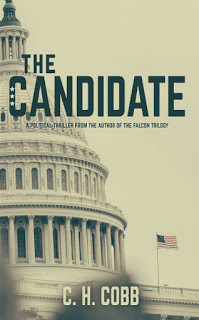
More importantly, the tale is a teaching tool about the Founders’ intentionstanding behind the text of the Constitution. In addition to reading books and articles on presidential campaigns andcontemporaryconstitutional issues, while researching the storyI also read the Constitution (of course!) and the Federalist Papers. The Federalist Papers, a series of articles written by Alexander Hamilton, James Madison, and John Jay in 1788, was an effort to explain the thinking behind the Constitution and to encourage the states to ratify it. Each chapter of The Candidate is headlined with a relevant quote from the Federalist Papers, or other significant historical documents.
Readers will gain a fundamental working knowledge of our three branches of government and the checks and balances written into the Constitution. The Candidatewill also provide responses to several of the slanders the modern progressive movement throws against the United States and its history.
The pacing of the book might cause you to miss your bedtime, and by the end of the story you’ll be wishing Henry Marshall was an actual choice on the ballot. I certainly wish he was! The tale is written from a biblical worldview, contains no obscenities or sex scenes, but does have a few scenes ofviolence. Available in print or ebook format from Amazon or from your favorite bookstore through the Ingram catalog. Signed print copies are available from me.
Comments from Amazon readers:
“I recommend The Candidate, with one warning. It's hard to put down.” -Laura V
“I skipped class today so that I could finish the book. I've read all Cobb's books and this one is near the top…” -T Setliff
“I started reading books by C. H. Cobb a few years back. His works are really what got me back into reading. The Falcon series being the first and then on to the Outlander Chronicles, with his unique writing style and outstanding attention to detail of the locales and characters in his novels. The Candidate is no exception. . . . While it is a novel, it's obvious that the author has once again done his research into what our founding fathers intended as they formed our nation, wrote the Constitution, and established the three branches of government, specifically as it relates to the federal government. A definite must read.” -C Denlinger
“Just finished this last night and was sad to see it end as it was such an interesting read. While it is a novel, it was also very educational about our Founding Fathers and the Constitution. A very believable plot and set of characters. So real, in fact, I wish we could have Henry Marshall as an actual candidate.” -A Nilsen
“Excellent and thought provoking read that I could not put down!” -J Mattheis
August 27, 2020
Review of Nancy Pearcey’s Saving Leonardo: A Call to Resist the Secular Assault on Mind, Morals, and Meaning
Saving Leonardo is an extremely well written, heavily documented and illustrated exploration of how the dominant Christian, Western worldview of the Middle Ages evolved into contemporary Postmodernism. Pearcey’s thesis is that worldview drives culture and the artistic expressions of culture.
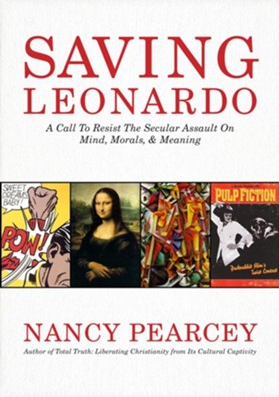
One of the foundational concepts of the book is the historical splintering of the concept of truth. The Western worldview for centuries viewed truth as unified; in other words, the material truths of the natural world pointed to equally certain spiritual truths. The design of nature revealed the moral intent of the Creator. The book of nature and the book of Scripture pointed to the same unifiedtruths. But the Enlightenment began splitting the concept of truth: empirical, material facts versus religious/moral opinions and values. Facts are certain and objective; religious/moral values are subjective and therefore relative.
Pearceydemonstrates the beginning, widening, and final bifurcation of the fact/value split with numerous quotations from the preeminent philosophers of each age (Enlightenment, Romanticism, Modernism, Postmodernism). Shethen illustrates how the shifting worldviews were represented in art, providing examples of architecture, paintings, musical compositions, etc., andquotations from both the artists themselves and art critics.
In a word, Saving Leonardo is a virtual instruction manual for identifying the links between the spirit of the age, art (in all its forms) and the artist’s worldview. The book is heavily documented, which will be useful for researchers wishing for further exploration. Nancy Pearcey is one of the premier modern writers on the the philosophical concepts truth, worldview, and how they intersect with and drive culture.I’ve read Total Truthand Finding Truthand now Saving Leonardo, and found them all fascinating and instructive.
Note to the reader: if you are not already familiar with philosophical systems (materialism, existentialism, positivism, and a host of others), something that will greatly help as you read Saving Leonardo is to make a brief list of the various philosophical systems and their meanings when she initially defines them, because she will be referring back to them frequently throughout the book. There are so many it is easy to forget the salient points of each.
Saving Leonardo reminds me of Francis Schaeffer’s How ShouldWe Then Live: The Rise and Decline of Western Thought and Culture. Pearcey has been greatly influenced by Schaeffer’s thought, but she does a good job of moving the ball forward (I recommend both books highly).
Five stars—highly recommended.
July 13, 2020
A Cure for my Runner's Blues
I’ve discovered a cure for my runner’s blues, when I really don’t want to lace up and hit the pavement.

It’s found on Keith and Kristin Getty’s album, Facing a Task Unfinished , and the title of the number is “Beyond These Shores.”
Now, I’m not a music critic, being quite challenged to play the footnotes on a shoe horn. Notes are things I leave on my bathroom mirror, half-measures are how I approach running, and rests are what I do when done running. Movements are what I do to get from my chair to the cookie jar. I cannot make heads or tails out of a musical score.
But I love music—it moves me, frequently transforming my mood. And it often cures my runner’s blues (the wimpy pity-party I indulge in when I really don’t want to run—which is most of the time). Musictakes my imagination on flights of fancy, transporting me to far-away places.
Now, for those poor benighted souls reading this, for whom imagination isa superfluous luxury you left behind in grade school, you might as well stop reading now, because you really won’t get what follows.
Here we go: in the first movement of Beyond these Shores, I imagine someone giving me a pointed, sarcastic rebuke. He’s playing a violin, and saying something like, “Aw, poor little Chris. Feeling sorry for ourself this morning, are we? Don’t want to lace up the running shoes?” At this point I’m usually slogging along, wondering why I ever started running to begin with.
But the music makes a sharp (but smooth) transition into the second movement. The self-pity violins morph into a fast-paced Italian sort of celebration, something you might hear in Momma Mia’s Pizzeria. Before long, in my imagination, I can see Snoopy dancing for joy on top of his doghouse—self-pity transformed into jubilation. My running pace picks up, I can’t help it.
The third movement is like a free-wheeling jam session with strings, banjo, bass, keyboard, and percussion—almost a jazz feel to it. Not only am I running faster, but I’m smiling while I run.
And by the time you get to the fourthmovement the violins are more accurately described as fiddles, and it’s a high-energy Nashvillehoedown. I am running with a big grin on my face, sometimes clapping in time with the music, woes forgotten, enjoying the blue sky, the clouds, the sunshine, the farmers’ fields, and just celebrating life as I run, thanking my Creator and Redeemer for such a beautiful day.
Try it. If you enjoy music and have an active imagination, you’ll probably love it. You can listen to it on youtube here: https://www.youtube.com/watch?v=S3jaurZNvZw
June 26, 2020
Book Review of Nancy Pearcey’s Finding Truth: 5 Principles for Unmasking Atheism, Secularism, and Other God Substitutes
Nancy Pearcey is one of those authors the breadth and depth of whose research is simply astounding. It would take me five lifetimes to read the books and authors she cites in Finding Truth .
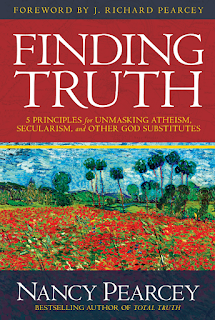
The modern evangelical church (in general—there are exceptions) has not done well in dealing with the honest skepticism of young adults. Rather than being eager to field tough questions and face intellectual challenges, it seems we have become fearful of them—perhaps even intolerant of hearing them. Nancy Pearcey shows us how to recover the honestintellectual punch that Christianity actually possesses to interact fruitfully with non-Christian worldviews and belief systems.
Pearcey assembles a methodology in five principles by which alternate worldviews can be examined and then respectfully but firmly repudiated. The first principle is Identify the Idol. All non-biblical worldviews have some sort of starting point—some faith-based assumption on which the rest of their worldview is built. Some God-substitute (inevitably, a limited part of creation)is elevated to ultimate or divine status.
The second principle is Identify the Idol’s Reductionism, and it is based on the fact that “when an idol absolutizes some part of creation, everything else must be explained in terms of that one limited part” [98]. The result dehumanizes people. “When we define God as a somethinginstead of a Someone, we will tend to treat humans as somethingstoo” [98, emphasis original]
Principle three is to Test the Idol: Does It Contradict What We Know about the World?I once heard Dr. Bill Edgar (Westminster Seminary) describe a similar approach as climbing inside someone else’s worldview and taking it out for a spin, to see if it works. News Flash: it won’t. No one can live consistently with an idolatrous worldview—at some point their life will contradict their professed belief.
The next principle is more philosophical: Test the Idol: Does It Contradict Itself. Pearcey walks through a number of worldviews and unmasks the fact that they are internally inconsistent and self-refuting. For instance, she takes aim at logical positivism:
What happened, though, when the test of logical positivism was applied to itself? Its central claim was that statements are meaningful only if they are empirically testable. But is that statement empirically testable? Of course not. It is not an empirical observation. It is a metaphysical rule—an arbitrary definition of what qualifies as knowledge. Thus when the criterion of logical positivism was applied to itself, it was discredited. It stood self-condemned. [185]
The final step is Replace the Idol: Make the Case for Christianity. One of the ways she makes the case is to help people understand that other worldviews are free-loading on Christian principles, most frequently Christian morals. They are assuming Christian principles, but have no logical support from their own worldview to do so. In her words, “You might say they function as ifChristianity is true” [220, emphasis original]. Her point is to gently confront the individual by showing them their ethics cannot arise out of their worldview, but only out of a Christian one.
The clarity of Pearcey’s writing, the extensive use she makes of the books and statements of non-Christian thinkers, and thecomprehensive documentation of all her points and citations makes this book an invaluable resource. Highly recommended—five stars.
June 11, 2020
A Guide to Psalms for the Depressed
June 4, 2020
Book Review: Lutzer's God's Devil
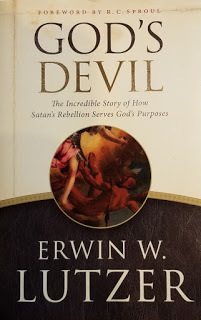
Though there are places in which doctrinal precision is lacking, nonetheless the book is a good contribution to believers who are struggling to understand how God can use the purveyor of evil to accomplish His good intentions. Lutzer writes in a very clear and accessible style.
If you are going to read this book, be sure to read David Powlison's Power Encounters: Reclaiming Spiritual Warfare which has a much more exegetically sound perspective on spiritual warfare. That book is, unfortunately, out of print and a little harder to find. Safe and Sound: Standing Firm in Spiritual Battles by Powlison is in some ways the application of the exegesis in Power Encounters, and is excellent. Both of these volumes contain what I consider to be a more doctrinally precise presentation of spiritual warfare.
Lutzer's book is four stars. Recommended.
June 2, 2020
Do Jesus’ actions in the temple condone the destruction of property as a legitimate form of protest?
In recent days our country has witnessed once again that racism still reigns in corrupt hearts. We have seen a recent flurry of horrific injustices being committed against law-abiding black citizens of the US. The most recent outrage was the sadistic murder of George Floyd by a dirty cop, a man wearing a uniform that is supposed to speak of protecting and serving the citizenry, not murdering them. Given the past history of the USA, these evil acts simply reinforce to many people of color the idea that they never will get fairness or justice in a country that nonetheless proclaims on the equality of all men.
All Americans should be concerned about this. All Americans should be heart-broken about injustice of any form, particularly when an entire race is on the receiving end of it. It calls for a continued struggle to enact just laws and to pray that individual hearts are changed by the Gospel of Christ.
One of the dangers when we see injustice is that our righteous outrage can easily become sinful anger—anger that provokes us to respond in a way less than Christ-honoring. I believe that the meme floating around on the web which displays Jesus cleansing the temple is an example of a reaction that does not honor Jesus. The meme implies that since Jesus destroyed property, therefore destruction of property is a valid form of protest.
 Because of the gross misrepresentation of Scripture—and of Christ’s actions—such a train of thought presents, I feel it necessary to respond rather pointedly to that meme.
Because of the gross misrepresentation of Scripture—and of Christ’s actions—such a train of thought presents, I feel it necessary to respond rather pointedly to that meme.Like most twisted applications of Scripture, thememe ignores the biblical context and amounts to little more than a hijacking of Scripture to assert something that Scriptureactually condemns as sin.
The biblical event is recorded in John 2:13-22.
Let’s begin examining the issue by asking some questions, starting with, who is Jesus as comparedwith who are we? Jesus is God, we are not. As God He can judge, condemn, and punish in ways we cannot. As God, all His ways are just—that is simply not true of us. One of the interesting points from the temple cleansing text in John is that the Jews asked Him by what authority He took action. Jesus answer in verse 19 is instructive: Jesus answered them, “Destroy this temple, and in three days I will raise it up.” This is essentially a claim of deity: Jesus was claiming to have the power of self-existence, the power of ultimate being. His disciples later understood it properly as a reference to Jesus power to raise Himself from the dead. In other words, Jesus’ claim to the authority to wreak such destruction in the temple was tied directly to the fact that He is God Himself.
Who owns the temple, the tables, the money changers, and the sheep on a thousand hills? Jesus does. It was “My Father’s house.” So Jesus was destroying property that belonged to Him, property that was located in the temple, not out in Jerusalem neighborhoods.That property was only in temporary possession of the money changers as a stewardship (one they were abusing!). It was not a random act of destruction.
Who laid down the law with respect to the proper use of the Temple? Yahwehdid, and guess who Jesus is: Yahweh Himself. So in the cleansing of the temple Jesus was punishing the violators of both the sanctity of the temple and the sanctity of the Law. It is clear in the text (vv. 14-16) that Jesus was punishing the specific violators, not random individuals.
In any case, Jesus routinely did things in His earthly ministry that we are forbidden to do, such as forgiving sins (Matthew 9:1-6). While we are enjoined to forgive one another, we ourselves are not the forgivers of injustices committed against God Himself. Jesus could do what we cannot. Notice that Jesus’ action of cleansing the temple was never duplicated by the apostles—even though the temple corruption and money-changing persisted.
Not only is there a deep biblical context to the cleansing of the temple, there is also a contemporary cultural context to posting this meme, and it brings up more questions. What is ourcontemporary cultural context? In cities across America, random property is being destroyed as people give free reign to their anger at the horrific injustice of the murder of George Floyd. This anger is now manifesting itself in unlawful ways, and is working against justice.
So, what is someone saying when they present this meme on social media, given the current context?Are they simply stating a propositional truth, Jesus destroyed property? Or are they making the claim, Jesus destroyed property therefore it is a legitimate form of protest that aggrieved people can participate in? What is the agenda of posting the meme: the first statement, or the second?
To claim thatformer is all one means is possible, butwhat is the point in broadcasting that Jesus destroyed property if there is no larger meaning attached? It’s a little like randomly spouting facts: Jesus walked on dusty paths; Jesus drank water. Light bulbs are sold in Walmart. Uh-huh. So what? Unless you are attaching some theological significanceto the statement, such as Jesus is Lord of all, therefore He may do as He pleases when He cleanses the temple, there’s not much point to such a statement.
Given the context of what is happening in America today, most people will read the meme and jumpto the second agenda (regardless of what the poster actually intends): Jesus destroyed property therefore it is a legitimate form of protest that aggrieved people can participate in. If that is the subtext of the meme in most cases—and it is pretty obvious that it is—it raises more questions.
If destruction of property is a legitimate form of protest, on what grounds do you decide whose property is to be destroyed? Must the ownerbe personally connected with the event that caused the aggravation, or is random destruction acceptable?
If random destruction is acceptable, where is the God-honoring justice in that? On the other hand,if the owner (of the property to be destroyed) isguilty of actions that caused the riot leading to such chaos, is that a matter for the law to handle, or for mob justice?Do we really want mob justice?Does not this meme bring to mind that verse in Judges 17:6, “every man did what was right in his own eyes”? Judges was a time of perverse moral chaos. That verse is a rebuke, not a commendation.
One cannot evadethese questions. Justice demands an answer. Posting this meme in our current social context at best displays a misunderstandingof Scripture, and at worst a devious twisting of Scripture. The temple text is not teaching us anything about means of legitimate humanprotest.
When I resort to the destruction of someone else’s property, itis sin. Itis not an option for any Christ-honoring believer. Jesus did what He did in the temple because He is God and He owns it all—for Him it was not sin. We are not God, and destroying someone else’s property is the equivalent of theft.Ignoring this crucial distinction not only twists the Scripture in the worst way, thememe encourages more sin and violence from those who now think they have biblical permission to destroy things. What we need to destroy is hatred. What we need to change, are hearts.
The Bible should have the last word: Never pay back evil for evil to anyone. Respect what is right in the sight of all men. If possible, so far as it depends on you, be at peace with all men.Never take your own revenge, beloved, but leave room for the wrath of God, for it is written, “Vengeance is Mine, I will repay,” says the Lord.“But if your enemy is hungry, feed him, and if he is thirsty, give him a drink; for in so doing you will heap burning coals on his head.”Do not be overcome by evil, but overcome evil with good. (Romans 12:17–21, NASB95)
March 12, 2020
Review of Cormac McCarthy's All The Pretty Horses
All the Pretty Horses is the first book of McCarthy’s critically acclaimed Border Trilogy (the other two books are The Crossing and Cities of the Plain). It is a book and trilogy I have been looking forward to reading.
Whether or not you enjoy this book will depend more on whether you enjoy literary fiction than on the author’s skill. Cormac McCarthy is beyond dispute an award-winning and very skillful author, and the book was a national bestseller.
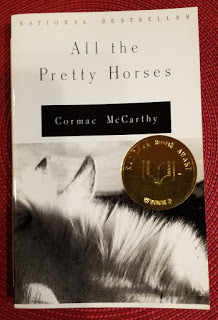
First, the strengths. I like the tale itself: set in the early twentieth century, two young men decide they’re going to cross the river and head south into Mexico on horseback. On the one hand they are runaways, but on the other they are competent young men, skilled in ranch work and back country living, wanting to live the life of the Old West. With no destination in mind (other than south) , they wind their way through Mexico and end up breaking horses on a ranch far south of the border. Their various adventures are interesting and very believable.
The setting seems very authentic, especially regarding the Mexican ambiance (it helps if you speak Spanish—I don’t). In many passages I felt like the author was himself experiencing what he was writing about—it seemed viscerally real. The book is gritty with the dust and dirt of the desert south—there is nothing romantic about the portrayal.
The English dialog is quite strong for the most part. It fits well with the way McCarthy has constructed the characters. I don’t recall reading a single line of dialog and thinking, “John Grady Cole would never say that!” Same for the rest of the characters. I love the laconic drawl of the cowboy character, and McCarthy has captured itexquisitely.
The strongest part of the book isthe characters and their development. McCarthy has just the right touch, and the growth of the characters through the tale is very well done and, again, very believable.
Unfortunately the weaknesses of the book are significant, in my opinion. I am not a fan of literary fiction, finding it at times pretentious, and Pretty Horses is no exception. He has many paragraphs of high-flying description, composed of really, really long run-on sentences that are occasionally near to incoherent. Sometimes the similes he employs seem to be constructed of words picked at random—they don’t contribute to the picture being painted in your mind by the rest of the narrative.
For me (and I realize this is just my opinion and other readers may vociferously disagree), Pretty Horses became simply tedious in the middle of the book. I put it down for several weeks because it had become boring. Finally I made myself finish the volume (and I must confess to skimming), thoughthe story does pick up with better pacing toward the end.
I love McCarthy’s minimalist style in The Road, an outstanding story. Some of that fine, tight, minimalism persists in No Country for Old Men . These are his later works. Pretty Horses is a different story and for me, a little disappointing. Three stars.



